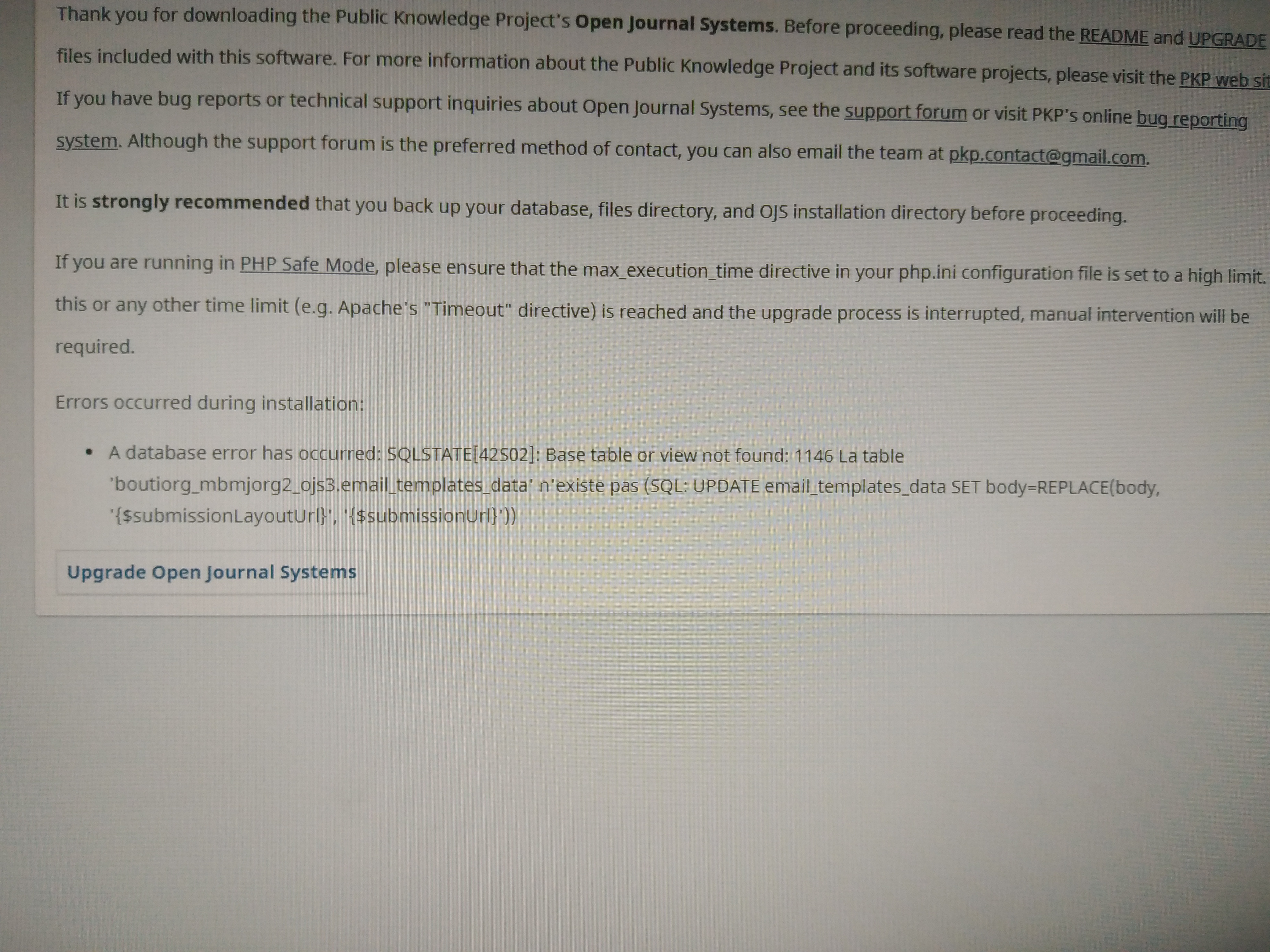
Hi @jnugent
When switching tables from MyISAM to InnoDB this problem arises
Have a good day
Hi @rebas_saber
It doesn’t look like you restored from your original backup before switching the tables to InnoDB. email_templates_data is a table that would have existed in your old database, but gets renamed during the upgrade to 3.3.
So, you’ll need to restore your 3.1.2.4 backup again, then switch all of your tables to InnoDB. At that point, I’d recommend making another backup so you don’t need to do that step again, and then try the upgrade to 3.3 again.
Regards,
Jason
Old database tables the type InnoDB,
But, when you upgrade some of them become MyISAM.
Hi @rebas_saber
That sounds like a conversation you’ll need to have with your systems administrator or web host then. MySQL can be configured to have a default storage engine, and it sounds like yours is set to MyISAM. Unfortunately that isn’t something I can help you with.
https://dev.mysql.com/doc/refman/8.0/en/storage-engine-setting.html
Cheers,
Jason
I am doing this upgrade only on localhost and if successful i will do it on live hosting
Greetings. This is a great discussion! I have not upgraded yet, but wonder if PKP ever considered creating a checklist for upgrades, which would help OJS administrators to prepare for upgrades that involve contingencies (database, php, etc.) and other steps prior to doing the upgrade. OJS is not Adobe Reader or Firefox that you can upgrade by hitting a button or link – it is much more complicated. This discussion could be a test case for developing a checklist for most routine upgrades.
Anyway, how long should one wait before committing to a new version?
Best!
Arjun
Hi @asabhar
We do typically try to provide a checklist and notes but because OJS is very much “in the wild” it can be hard to cover all of the use cases. Especially with older versions, as they get upgraded, users often run into database inconsistencies that break upgrades, or hosting environments that end users may not have control over. We do provide documentation here:
https://docs.pkp.sfu.ca/admin-guide/en/managing-the-environment
and that may be useful.
As for committing to a new version, at PKP|PS we wait until there’s a “.1” version just to be relatively sure that the major bugs are fixed before we upgrade clients. The dev team performs extensive testing but it’s difficult to catch everything.
Best,
Jason
Thanks for the link, Jason.
I, too, think, that it would be practically impossible to cover all types of installations because the infrastructure of the host may vary (in-house vs. hosted ones). PHP will know best how to plan for upgrades, so a list of critical checks (like database as you write, php) and other recommended upgrades before and after upgrades (as may be needed for plugins like Crossref/DOI, etc.) would be helpful.
We are at 3.2.1.1 now and we upgraded last fall. When do you think the next highly recommended or critical upgrades will come out? Will moving to 3.3.0.4 be too soon given all the reports of issues on this forum?
Thanks!
Arjun
hi @jnugent
i have a question, if you install latest version, Can the “files” file be exported to a new version and it works well, without the old “public_html” and “database.sql” files ???
Hi @rebas_saber
You’re referring to the files_dir directory in the config.inc.php file? It depends on the versions between OJS. Between 3.2 and 3.3 I don’t think there is a difference in the files structure, but there probably is between 3.1.2 and 3.3. The various steps during the upgrade often run commands to fix issues in the files tree so copying the files directory between various OJS versions may or may not work. In general I don’t think I’d recommend it.
Best,
Jason
Hi @asabhar
At PKP|PS, we are waiting for 3.3.1 to be officially released before scheduling upgrades to it. The dev team consider 3.3.0.4 to be the best stable version and endorse it, however.
This is perhaps beyond the scope of this thread, but we use Git to track the stable branches for our installations, so instead of targeting a point release, we track e.g. the stable-3_3_0 branch and so we can upgrade or pull in bug fixes pretty easily.
Cheers,
Jason
Thank you Jason. I forgot about the Git site, but I will keep checking that also. Best! --Arjun
Hi @jnugent
I upgraded on a live server, but I have a problem with some of the links not working
http://test.bouti.org/index.php/ijms
But some post works
http://test.bouti.org/index.php/ijms/article/view/422
Hi @rebas_saber
Can you be more specific? The first link you posted seems to work for me. The second one does as well. What doesn’t work?
Best
Jason
this for all links in this version journal : http://test.bouti.org/index.php/ijms
example:
first link not work : Burden and Trends of Leishmaniasis over the last one Decade Across the Globe: Trend Analysis of WHO Regions (http://test.bouti.org/index.php/ijms/article/view/295) , but link PDF workig, (http://test.bouti.org/index.php/ijms/article/view/295/599)
Okay, but those are definitely 500 errors and there will be things in your log telling you what the problem here is. Is this the Health Sciences theme? Did you upgrade it to ensure compatibility with OJS 3.3?
Yes Health Sciences theme.
You have upgraded theme and all plugins
I suggest you try a different theme, then. If the problem is resolved, head over here:
And file an issue. You still haven’t looked at your logs or told us what the error is.
Best
Jason
@jnugent
Where are i find this logs or told in my dashbord ???
They won’t be in the OJS dashboard. You’ll need to look in your Apache server side error logs for PHP “Fatal Errors”.
Best,
Jason